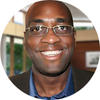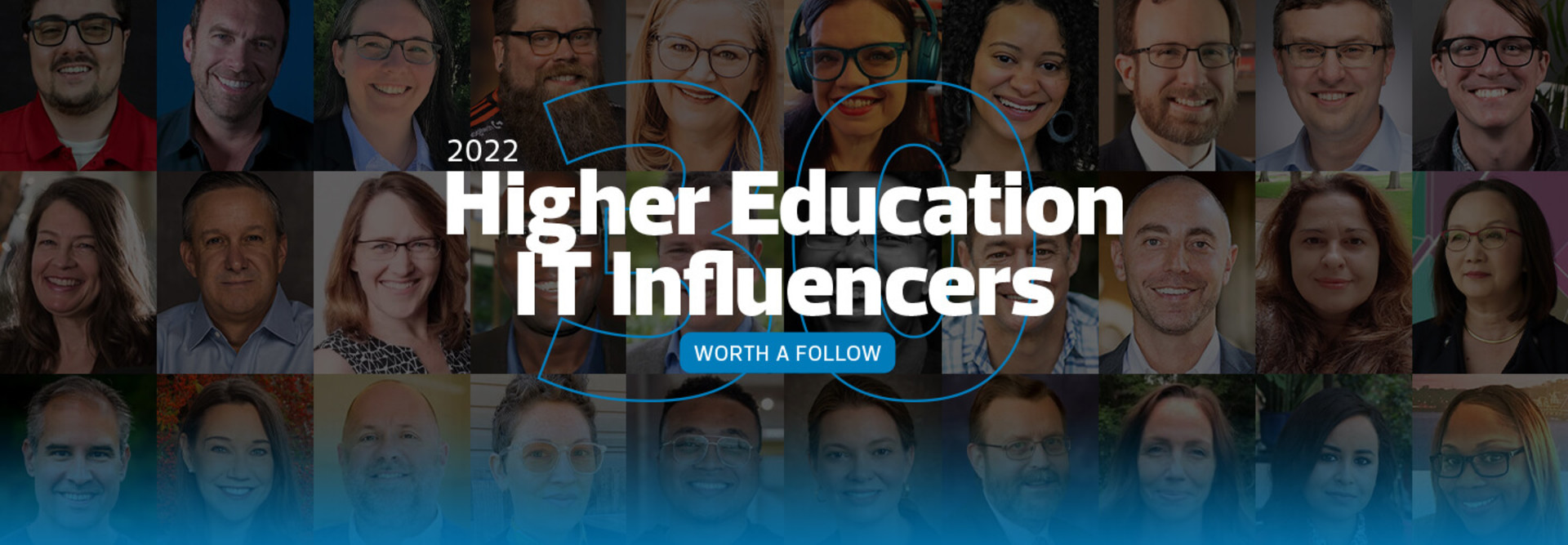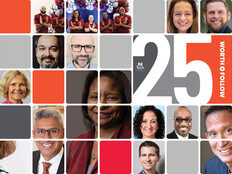30 Higher Education IT Influencers to Follow in 2022
Anyone who works in higher education knows the value of IT. Colleges and universities are entering a new normal for education, and it’s up to technology leaders to guide them into this new frontier. From hybrid learning to cybersecurity, universities are facing new challenges, making new investments, and learning new skills and lessons along the way.
For our 2022 list of higher ed IT influencers to follow, EdTech: Focus on Higher Education chose 30 people using their platforms to propel universities forward. Whether they’re working with educators to boost their digital teaching skills or promoting diversity and inclusivity in collegiate esports, these influencers are making waves at their institutions. Take a look at this year’s list of higher education IT leaders, bloggers, podcasters and social media personalities and give them a follow.
If you’re on the list, share the news with your followers! And don’t forget to grab our influencer images for your own social media pages or websites.
Click the banner below for exclusive content about emerging technologies in higher ed.

Adam Antor is Florida Southern College’s director of esports and chair of the National Association of Collegiate Esports Competition Council. His streaming talk show, Collegiate Esports Talk, can be found on his Twitch channel and covers hot topics in high school and collegiate esports.

Alex Boylan was part of the winning team on The Amazing Race in 2002 and currently hosts The College Tour, a show streaming on Tubi and Amazon Prime Video. Each episode tells the story of a college or university through the eyes of its students. The show has filmed four seasons and has showcased 48 colleges and universities in this format.

Ann Gagné is an educational developer for the University of Toronto who emphasizes accessible and inclusive instructional design in her work. She runs the All Things Pedagogical blog, where she dives deep into pedagogical ethics and instructional technology.

Bennett Newsome is the esports strategist for Full Sail University’s Armada esports team, where he works on a range of initiatives that include directing the varsity team, collaborating on networking and partnerships, and guiding the Armada’s Stream Team student broadcasters. Newsome is also a Twitch partner, specializing in community building and gaming.

Bonni Stachowiak is dean of teaching and learning at Vanguard University, leading the Institute for Faculty Development. Bringing a passion for equipping educators with digital tools to the airwaves, Stachowiak also hosts the Teaching in Higher Ed podcast, which features interviews with educators on topics ranging from digital pedagogy to work-life balance.

Casey Fiesler is an assistant professor in the Department of Information Science at the University of Colorado Boulder, where her research focuses on governance and ethics, online communities and more. Outside of the university setting, Fiesler runs a popular YouTube channel and TikTok account that cover topics relating to digital ethics, technology law and academia.

In addition to her role as assistant professor of communication at University of Maryland, College Park, Catherine Knight Steele is director of the university’s Black Communication and Technology Lab, where her research focuses on Black culture and discourse and digital communication. She is the author of Digital Black Feminism, a book that explores the relationship between Black women and the past, present and future of technology.

David Seidl is the IT vice president and CIO at Miami University in Ohio. Before his time at Miami University, he was director of information security at the University of Notre Dame, where he co-led the cloud migration and operationalization of the university’s data center. He is a thought leader and conversation starter on Twitter, frequently participating in discussions with other technology leaders, both in and out of higher ed.

Derek Bruff is assistant provost at Vanderbilt University, as well as interim director of the Vanderbilt Digital Commons. There, he oversees programming to help faculty develop digital technology skills. Also an author, Bruff published Intentional Tech: Principles to Guide the Use of Educational Technology in College Teaching in 2019. He also hosts Leading Lines, a podcast that features interviews with educators, researchers and technologists about creative uses of educational technology.

Dustin Ramsdell is a program coordinator for Noodle, an edtech platform connecting higher education institutions with upskilling programs. He also hosts a weekly podcast called Higher Ed Geek, which covers the latest in educational technology, combining Ramsdell’s passion for higher ed with his self-described love of “geeky stuff.”

Gayleen Gray is assistant vice president and CTO of McMaster University in Ontario, Canada. She is on the EDUCAUSE board of directors and most recently presented at the organization’s conference on Canada’s approach to cybersecurity. She is committed to building relationships with other higher ed IT professionals, collaborating with her peers in Canada and the U.S.

Jeff Selingo has written about higher education for more than two decades and is the author of three books that made The New York Times’ bestseller list. Selingo is a special adviser for innovation and professor of practice at Arizona State University. He also co-hosts the podcast FutureU, which focuses on the future of higher education.

Jill Finlayson is the director of the Expanding Diversity and Gender Equity (EDGE) in Tech Initiative at the University of California, a group with the mission of boosting participation and advancement for women and people of color in technical fields. She is an advocate for women in technology and a frequent speaker on ethics and equality in the tech industry.

Kelvin Bentley is a senior consultant for WGU Labs. He has been a digital learning consultant for more than 25 years and has led online learning initiatives for two- and four-year institutions. He also has a daily online newsletter that he shares on Twitter.

In addition to serving as the executive director of the University of Central Florida’s Center for Distributed Learning, Kelvin Thompson co-hosts the university’s TOPcast. TOPcast, which stands for The Teaching Online Podcast, is a weekly, university-produced podcast that features interviews and discussions about all things online learning.

Kishonna Gray is an associate professor at the University of Kentucky and the author of Intersectional Tech: Black Users in Digital Gaming. She is an interdisciplinary, intersectional digital media scholar whose areas of research include social inequalities in virtual gaming communities.

Mark Deppe is the director of the University of California Irvine’s esports program. In 2010, he led UC Irvine in developing the first esports program at a public university. Since then, he has continued to focus on pursuing excellence in the program’s five pillars: competition, academics, research, community and entertainment.

Matthew Rascoff is vice provost for digital education at Stanford University, leading a department launched in the fall of 2021. Upon its creation, the department joined with the National Education Equity Lab to deliver Stanford courses to underserved students nationwide. Rascoff is also part of EDUCAUSE’s Digital Transformation Task Force.

Maya Georgieva is the senior director of the Innovation Center and XR, AI, and Quantum Labs at The New School, where she leads a team driving innovation focused on immersive storytelling, quantum computing, AI, future interfaces and design. She is also co-founder of Digital Bodies, a consulting group focused on the impact of immersive and wearable technology on education. She is a frequent speaker on the topic of VR and XR, recently presenting at SXSW EDU and EDUCAUSE’s annual conference.

Melissa Woo is executive vice president for administration and CIO at Michigan State University. She was the recipient of the EDUCAUSE 2019 DEI Leadership Award and served on the organization’s inaugural DEI advisory committee. She is passionate about developing rising IT leaders and promoting diversity, equity and inclusion in IT.

Michael B. Horn is the co-founder of and a distinguished fellow at the Clayton Christensen Institute and a senior strategist at Guild Education. He is the author of several books on disruptive innovation in higher education. He also co-hosts the podcast FutureU, which focuses on the future of higher education.

Michelle Pacansky-Brock is faculty mentor for online teaching and learning with the California Community Colleges — California Virtual Campus online education initiative, coordinating professional development in support of quality online teaching and learning. She is currently leading a grant project with the California Education Learning Lab that will examine the impact of humanized online instruction on diverse students in undergraduate online STEM courses in California.

Phil Hill is an edtech consultant who has worked with numerous clients, including Western Governors University, the California Community College System, UCLA, Bournemouth University, Lumen Learning, Coursera, multiple investment firms and more. He runs a popular blog, Phil on EdTech, and is a frequent contributor to industry publications.

Sarah Thorneycroft is acting program director of digital education at the University of New England, Australia. She is an advocate for inclusive and equitable learning spaces and environments.

In 2020, Sergio Brack graduated from the University of Mississippi, where he was the president of the university’s esports league. Today, Brack is director of esports at University of Maryland and is involved with Cxmmunity, an organization committed to increasing diversity in esports. He also co-founded the College Call of Duty league, an esports league that promotes accessibility and inclusivity in collegiate gaming.

Sharon Pitt is vice president of IT and CIO at the University of Delaware, where her goal is to advance the university’s education, research and economic development missions. She is a EDUCAUSE board member, an EDUCAUSE Hawkins Leadership Roundtable mentor, chair of Internet2’s community engagement program advisory group, and a board member of the New York State Education and Research Network.

Before serving as CIO of Seton Hall University, Stephen Landry was director of the Center for Academic Technology at the school, responsible for integrating technology with curriculum in the 1990s. Today, thanks in part to those efforts, Seton Hall has been recognized by U.S. News and World Report as one of the most connected college campuses in the country.

Tanya Joosten is director of the National Research Center for Distance Education and Technological Advancements at the University of Wisconsin-Milwaukee. She works to support student success and access through identifying key research-based practices, with particular focus on students who are first-generation, affected by poverty, racial minorities and/or disabled.

In addition to her work as assistant director of the Center for Research on Learning and Teaching the University of Michigan, Tazin Daniels is an equitable digital learning expert with the Every Learner Everywhere Expert Network. She provides professional development for instructors, helping them teach online.

Tonya Bennett is director of educational technology at the University of Pennsylvania School of Veterinary Medicine. She is also a co-founder of the Anti-Racism in Academia program and is active in diversity, equity and inclusion initiatives at the University of Pennsylvania. In 2020, she served as a small-group facilitator during Penn’s annual symposium, focused on women in STEM to honor Women’s History Month. She received EDUCAUSE’s 2021 Rising Star Award.











